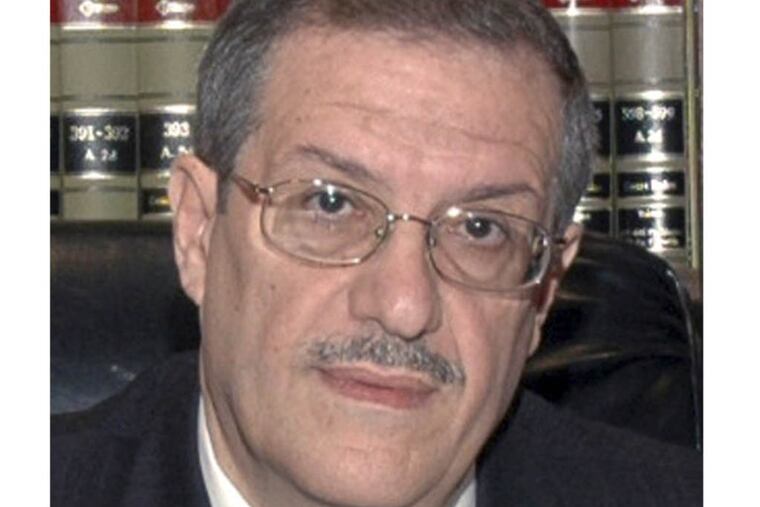Panepinto, judge who imposed huge sanction, had low profile before
Paul Panepinto couldn't have known that what he wrote for the Widener University law review in early 2009 would hit close to home five years later.

Paul Panepinto couldn't have known that what he wrote for the Widener University law review in early 2009 would hit close to home five years later.
In an article titled "The Trial Judge as CEO," Panepinto, a Philadelphia Common Pleas Court judge, laid out a vision for judges. They would reach beyond traditional roles and take leadership posts in service groups to tackle a plethora of social issues, from education to gun violence and ethical misconduct.
One pitfall, he noted, is that a judge might be misunderstood.
"A judge stuck between public pressure and the facts or rules is caught in a dangerous situation where he could easily lose the confidence of the people or the trust of his peers," Panepinto wrote.
For much of his 23-year career on the bench, Panepinto flew under the radar, attracting little publicity or coverage. That changed in November when he imposed an unprecedented penalty of nearly $1 million on Malvern defense lawyer Nancy Raynor for eliciting banned testimony in a medical malpractice trial. Since then, the judge's sanction has stirred precisely the kind of public pushback he warned of in his 2009 article.
Former Common Pleas Court Judge Gene D. Cohen said sanctions in civil litigation, which in this case would be paid to the lawyers and plaintiffs who opposed Raynor, rarely are more than $10,000.
"This is basically a court abusing its discretion by imposing fees and costs and enriching a group of lawyers without due process," Cohen said of Panepinto's $946,179 fine against Raynor.
Most lawyers who have tried cases before Panepinto, 65, say he is low-key and fair. And in several judicial elections in which he ran for state appellate court seats, he was known as a prodigious fund-raiser and an ardent opponent of abortion.
Still, many city lawyers express astonishment at the magnitude of the sanction he imposed on Raynor. Her offense? One of her expert witnesses breached the judge's order and testified that a woman at the center of the 2012 medical malpractice trial had been a smoker.
Raynor, whose business and personal bank accounts were frozen as a result of the judge's action, says the penalty came close to shuttering her four-lawyer firm until it was temporarily lifted in February by Superior Court.
"He knows he can ruin me, with impunity," Raynor said.
On April 24, Panepinto reaffirmed his opinion after Superior Court ordered him to reopen the case and hear new evidence. In effect, Panepinto's decision to stand by the sanction sent the matter back to Superior Court, which now must decide whether to strike the penalty, reduce it, or let it stand.
The case began in 2007, when Rosalind Wilson went to the emergency room of Roxborough Memorial Hospital complaining of chest pains. Doctors failed to inform her of a suspicious and possibly cancerous nodule that appeared on a lung X-ray.
She died of lung cancer two years later and her relatives sued.
At the outset of the trial, in which Raynor defended a Roxborough Memorial emergency room physician, Panepinto ordered that there be no mention of Wilson's smoking. He reasoned that Wilson, apart from her smoking, was entitled to the best health care possible. Yet midway through the trial, defense expert Dr. John Kelly, responding to a question from Raynor about Wilson's potential cardiac-risk factors, told the jury she was a smoker.
In his order, Panepinto found that Raynor deliberately elicited smoking testimony to bolster her defense. Raynor, for her part, has come forward with three witnesses who testified under oath that she warned them not to mention Wilson's smoking.
"It's a stunning order, a frightening order," said Bill Ricci, a Philadelphia trial lawyer whose practice focuses on defending automobile and aircraft manufacturers and others in liability lawsuits. Ricci said he has tried two cases before Panepinto and described his trial management as "terrific in all respects."
Like most judges of Common Pleas Court, Panepinto, an Overbrook resident, mostly has toiled in obscurity. He did his undergraduate work at Villanova University, earned his law degree from Widener University in 1976, and went on to earn a master's in political science from Villanova in 1979.
Panepinto, who declined to be interviewed for this story, has twice run for the state Supreme Court, in 2007 and 2009, and lost both elections. In 2011, he ran unsuccessfully for Commonwealth Court. Although his campaigns gained little coverage, he collected more than $800,000 through fund-raising, much of it from lawyers who practice in the state court system. Some of the largest checks came from personal-injury lawyers, including $50,000 from a firm in Texas in 2007.
In late 2014, Panepinto again contemplated running for higher office and asked the Pennsylvania Bar Association to consider him for the Supreme Court and the state's two midlevel appellate courts, Superior Court and Commonwealth Court, as part of its evaluation process.
The association gave Panepinto its midlevel "recommended" rating, but in late December the state Republican Committee declined to endorse him as a primary candidate. Lacking the party's backing, he chose not to run again.